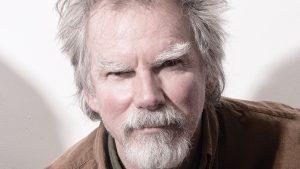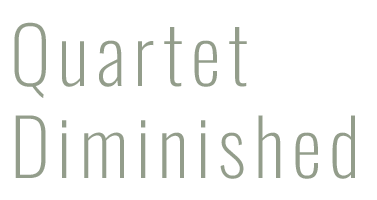
Modern Iran (technically the Islamic Republic of Iran) is home to one of the world’s oldest civilizations. The former Persian Empire was especially noted for its artistic traditions, including Persian classical music, which is still a prominent performance style in 2021. The current government is not known for openness to Western influence, as exemplified by censorship of internet content and the banning or censoring of Western movies in Iran, so the country does not look like it would be receptive to any sort of music with Western influences . But music is like a desert flower, able to find purchase in the most hostile environments; and the artistic impulse among Iranian musicians will not be denied.
Quartet Diminished was established in 2013 by guitarist Ehsan Sadigh. This is their third album, following Station One (Hermes Records, 2015) and Station Two (Hermes Records, 2018). Their music is stylistically diverse, drawing freely from contemporary jazz, art rock and avant-garde music. The membership has been relatively stable. Sadigh (electric guitar) has had band mates Mazyar younessi (piano, voice) and Rouzbeh Fadavi(drums) on all three albums. Sohil Peyghambari (bass clarinet, soprano saxophone) joined on the second album and appears again here. Guest Colin Bass (bass guitar) technically makes the quartet a quintet, the first time the group has had an instrument explicitly devoted to the bass function.
The title tune opens the set with a ponderous theme underlaid by steady drums and skittering piano. Sadigh’s guitar takes over the rhythm, joined by piano and bass clarinet—until the full band finally kicks in. The driving ostinato continues until it finally gives way briefly to a three way conversation between guitar, piano and bass clarinet. There is space for brief clarinet and guitar solos, but it is very much an ensemble sound (which may even be substantially composed rather than improvised). “Rhapsody” begins with atmospheric sounds before guest Colin Bass’ plaintive vocals take center stage (sung in English). A lovely ballad, and a marked contrast, which then gives way to a powerful rhythmic ostinato, finally building to a burning guitar solo. The track recalls both King Crimson and Nik Bärtsch, encapsulating the band’s stylistic range.
“Speechless Pt. 2” (the title may be a reference to “Speechless Rhythm” on Station One) opens with a rhythmic flurry that leads into a spacious legato section. Peyghambar’s: bass clarinet gets a lengthy feature spot, and younessi’s gentle piano brings it to a lyrical close. “Mood Pt. 3” (Station Two contains “Mood Pt. 1-2”) concludes the album in a contemplative mood. Long soprano saxophone lines lead into a final ostinato. Fadavi plays a restrained drum solo underneath before it ends with a sustained guitar chord. Quartet Diminished is an accomplished group with a distinctive collective sound. There are just enough Middle Eastern sounds to remind the listener where they are from, but they also have an international identity—and a skill set comparable to musicians anywhere in the world.

Camel bassist Colin Bass will make a live guest appearance with Tehran-based four-piece Quartet Diminished when they appear at London’s King’s Place Theatre on December 2.
“Brilliant players, complex sounds from piano, reeds, guitar and drums,’ says Bass. “I played and sang on a track on their last album and will be performing that track and a couple of others – all tracks are quite long – at their concert.”
Bass appeared on the band’s third album Station Three, which was released last year.
 Despite the repressive theocratic regime that governs Iran, some form of music is still being performed, even progressive improvised music – as this decisive CD proves. Iranian-Canadian guitarist Ehsan Sadigh and his cohorts, soprano saxophonist/clarinetist Sohil Peyghambari, pianist Mazyar Younessi and percussionist Rouzbeh Fadavi make up Quartet Diminished. The band recorded its four extended group compositions in Tehran in a style that mixes jazz-rock fusion and purer improvisation with Persian musical overtones.
Despite the repressive theocratic regime that governs Iran, some form of music is still being performed, even progressive improvised music – as this decisive CD proves. Iranian-Canadian guitarist Ehsan Sadigh and his cohorts, soprano saxophonist/clarinetist Sohil Peyghambari, pianist Mazyar Younessi and percussionist Rouzbeh Fadavi make up Quartet Diminished. The band recorded its four extended group compositions in Tehran in a style that mixes jazz-rock fusion and purer improvisation with Persian musical overtones.
From the first track while guitar flanges, sliced string chording and cascading piano licks relate to Western music, there are also sections where Fadavi’s measured thumps take on doumbek-like resonations and Peyghambari’s pinched glissandi project ney-like characteristics. At the same time, there’s no attempt to shoehorn textures from either tradition onto the other, merely to work out a mutual blend. So, for instance, the title track is as focused on drum press rolls, calliope-like trills from the reeds and buzzing guitar twangs as on any Middle Eastern inflections. Other tracks project R&B-like sax snarls, arena-rock-like guitar shakes, modulated drum ruffs and an exploratory interlude on Rhapsody which vibrates between piano key plinks and Morse code-like reed bites.
Overall, the sophistication of the performances suggests the quartet’s name is a misnomer. Rather than diminishing sounds, the band is augmenting all timbres into a satisfying Persian-Western fusion.
- Quartet Diminished – Station Two [Hermes Records 2018] by Scritto ilCategorie records,Jazz,postminimal

My goal was to form a band with musicians with different backgrounds and tastes. As a guitar player progressive and metal music have influenced me most. Our drummer, Rouzbeh Fadavi, comes from more jazzy background, our pianist, Mazyar Younesi, is graduated in classical music and also a conductor, and our woodwind player, Soheil Peyghambari, has more folk music background. Ehsan Sadigh, guitarist and one of the founders of Teheran based Quartet Diminished, points very clearly in his words at what were his purposes since the start of his band. Different identities collide in four different people’ backgrounds, western and eastern cultures clash, electric clashes with acoustic, Iranian classical clashes with western jazz and metal. Quartet Diminished is first and foremost a battle scene, where notes, modes, rhythms bring their history in and meet.
But wouldn’t this mix of influences risk to fall into chaos? Musicologist Carl Dalhaus once told that we should not talk about ‘identities’ in music, better to use the word ‘Wesen‘. The translation of this german term might be ‘being’, or better ‘consciousness of being’. When human beings are born, they gradually start creating their consciousness by difference: I am not the world outside [Marcello Sorce Keller Identities in traditional and western musics in Enciclopedia della Musica, Il Sole 24 Ore]. An identity is built upon a difference with other identities. This approach applied to music hints at how every culture might be seen as a separate from another. In the speed of light collapsing universe of today’s music cultures, bringing together the more distant sounds is becoming the rule. And the result is often a chaos producing system of multiple influences blended together. But is mixing cultures creating a new identity or is it just a plain juxtapositions of sounds? From my point of view as listener, I appreciate when the culture clashing process creates new identities. If you are looking for this option as well, then put Quartet Diminished on the top of your wishlist.
Take the sixteen minutes of Cluster, third track of their 2018 effort Station Two. While the length might surely appeal progressive rock fans, this is not exactly a typical ‘prog epic’, nor a classical suite. But something that fits in the middle. The slightly disturbing repetitions of piano intro’s power chords pave the road for the drums and guitar’ grandeur metal entry. Piano and bass clarinet answers back each distorted chord, but there’s not time left to start the headbanging. A sudden interruption places the piano back in. Younesi initiates a rubato dialogue with Peyghambari‘s saxophone with a sort of dorian mode feeling. An unison cascading line played by piano and guitar falls at the moment when the bass clarinet and drums may start back the sound and fury.
These frequent start and stops are the core of Quartet Diminished‘s music, thanks to the unique approach of the only single rhythmic element of the band, the drummer Rouzbeh Fadavi. A disquieting sense of disruption of our concept of the uninterrupted standard western song. If we take the perspective of traditional Iranian classical music and the music system of the avaz, which is based on the sequences of different moods and modes -to roughly translate that, then this structure seems no wonder. Ehsan Sadig offers his point of view on the traditional Iranian music: The influence of Iranian rhythms and melodies has precipitated in our subconscious somehow. Therefore, we don’t use them deliberately in many occasions, they just penetrate in our music in a subtle way. Coming back to the point of Cluster we left off, the rhythmic section in 3+3+3+2 first explodes vigorously, then placidly moves back to intro theme, while Ehsan Sadig plays shrilling bendings over a phrygian traditional scale. Suddenly piano’s descending rumblings move the atmosphere to a rondo-style -with the absence of the drums- that morphs in an intricate 5+3+4 jazz-rock rhythmic section. When the drum enters again in, Peyghambari is left the space to fill with his intense and prolonged folk echoes. If we ever looked for a definition of Cluster, then this might be: a chamber electro-acoustic suite played by traditionally influenced progressive musicians [!].
:quality(70)/cloudfront-eu-central-1.images.arcpublishing.com/thenational/OEFDSERVMX7YAEYKP24IFFXPFM.jpg) Quartet Diminished are a band keen on tackling different genres and musical styles.
Quartet Diminished are a band keen on tackling different genres and musical styles.
Formed in Tehran in 2012 by the quartet’s guitarist, Ehsan Sadigh, they released Station One earlier this year and are now presenting it on a European tour. It’s a fascinating mix of jazz-rock, folk, Oriental jazz and 1970s-influenced psychedelia.
A good example of how this works is the track, Yelemsi. Jagged riffs from the guitar introduce the piece, while in the middle-section, the soprano saxophone and the drums sound like the fast part of a Persian traditional musical suite.
The name of the group refers to differences in pitches between western and Oriental tuning, and the band sometimes purposefully move between the two.
Another of the album’s tracks, Tehran, is an ode to and a nightmarish evocation of the musicians’ hectic but also vibrant capital. The song mixes delicate sounds that reflect the legendary splendour of the city, along with growling clusters that mirror the industrial noises of a crowded metropolis.
In the opening track, Allegro Per Il Re, we hear a bass clarinet reminiscent of jazz-giant Eric Dolphy, and Miles Davis 1970s experimentalism, as well as the use of this instrument by Richard Wagner or Sergei Prokofjiev, expressing a sometimes brooding, sometimes melancholy mood.
It is such moods that Quartet Diminished explores, but they then swiftly rock everything up again with guitar and drums. The band also easily switches from high-energy jazz-rock to the delicate voice of pianist Mazyar Younesi, who pays tribute to the classical Iranian singing tradition. Then it diverts to free-jazz-like improvisation, while closing with just a simple beautiful duet between guitar and saxophone in the track Act VII.
The album appears on the Iranian label, Hermes Records, known for its adventurous high-quality recordings. These range from renowned classical Persian music masters, 20th century Iranian music in the western classical tradition and art-rock.
Neil van der Linden curates music events in the Middle East and North Africa, is editor of the online Gulf Art Guide and writes about Middle East music for Songlines.





